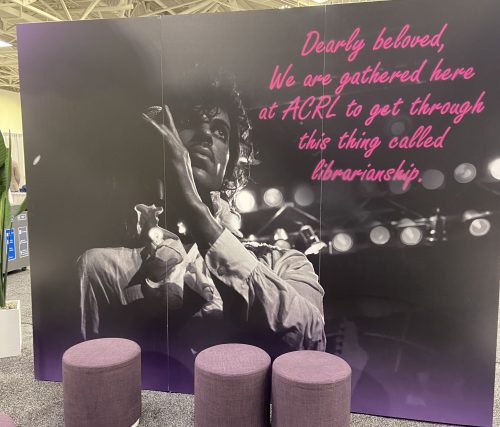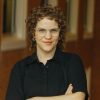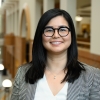Dearly beloved, we are gathered here today to get through this…recap of ZSR at ACRL 2025!
From April 2 – 5, a contingent of ZSR folks descended on Minneapolis, Minnesota (Prince, Mall of America, Lakes, Cheese Curds!) for the Association of College & Research Libraries (ACRL) Biennial Conference. Here is what we got up to!
Sandy
As ZSR’s new Associate Dean, I attended sessions focused on supporting library workers through challenges in a rapidly shifting climate, including ethical considerations in the adoption of Gen AI, uprooting narratives of career advancement, retention of library workers, assessment and advocacy for library services, space design for neurodivergent students, advancing equity work in a challenging time, and trauma-informed leadership practices. At this ACRL, I was struck by the themes that have always been present in the field that are now intensified by our current sociopolitical climate. Specifically, how we navigate tension by: surfacing assumptions and recontextualizing narratives, seeking connection and community, and slowing down to create space for intentionality, expansive thinking, creativity, and imagination.
No session was more illustrative of navigating this tension than the opening keynote by Dr. Ruha Benjamin. Dr. Benjamin turned a critical lens onto the quick adoption of innovative technologies–Gen AI, deep learning, computational data–by reassociating them with humanity and society. She questioned what counts as innovation, who counts as innovators, and shared how the widespread adoption of innovative technologies relies upon social inequity. Having read her recently published book, Imagination: A Manifesto (highly recommended!), the call to create space for imagination and creativity to build rather than focus on uprooting and dismantling, is a reminder that we have the power to disrupt our norms. We can choose to meet this moment by connecting with each other to co-imagine and co-create. The online resource, Imagination Playbook complements Dr. Benjamin’s book, and if others are interested, I’d love to engage in the discussions, games, and activities.
During the conference, I also hosted a community chat, “We’re Not Alone” for associate deans and associate university librarians of color and those interested in moving into these roles. The prompts mirrored my favorite 3-card Tarot spread: past, present, future. Past: What led you to your position and what keeps you engaged? Present: What challenges are you navigating as a BIPOC administrator/middle manager? Future: What factors define how you think about and approach future career moves or sustainability in your current role? After the breakouts, participants shared experiences, asked for and provided advice, and noted the value of connecting in community.
Best thing I ate: The bean and smoked trout dip at Owamni, a full-service Indigenous restaurant by the Sioux Chef
Molly
This was my final conference trip as a ZSR employee, so it was wonderful that so many of us attended and connected throughout our time there! It didn’t quite top ALA in Vegas (IYKYK), but it was excellent all around, from sessions to food to hanging with ZSR colleagues and catching up with friends from elsewhere. Two main themes to call out:
- External impacts on higher ed: At the SPARC members-only update & reception, there were disheartening stories of job and funding cuts and the impacts those are having, but also some glimmers of hope around continued support for public access to taxpayer-funded research. Fingers crossed that the plans for implementation later in 2025 hold.
- Leading through change: Understandably, sessions on leading through change were of interest, and there were several I attended. Nothing particularly revelatory was said, although it was reassuring to hear leaders of all kinds remind people that change is hard, you will make mistakes, pay attention to the culture, address toxicity head on, saying no is healthy, intentionality is key, planned onboarding is valuable, sometimes you can’t lead by consensus, and have a roadmap for change that is clear to all.
- Metrics: The numbers libraries count don’t always (or even often) do a good job of telling the story to what we do. There’s a tension between university administrators thinking from a business mindset with libraries thinking from a service mindset, and the metrics we collect sometimes don’t meet needs. Libraries need to share more stories, more impact statements to demonstrate our value. Gate counts ain’t it.
Best thing I ate: Parmesan-crusted grilled cheese and tomato jam sandwich at Highland Grill in St. Paul. Very close second were the blueberry pancakes at the hotel restaurant.
Roz
I wear a lot of hats, so my session attendance at ACRL is a bit all over the place. In addition to lots of time talking with vendors, I went to things about assessment, outreach, instruction, spaces, and more. If you want my full notes, they are here. I’ll focus here on some of the creative outreach ideas I came across, though.
- PLANTS! I saw a great poster session about checking out plants to students at the beginning of the semester along with care and feeding instructions. The only stipulation was that the pot came back – no shame if the plant died. But they reported that only 4 dead plants had come back. Another session discussed checking out small plants in cute pots to students as ‘writing buddies’ in the library.
- Letters: By far the best looking poster I saw (pictures in my full write up document) was about an outreach initiative where the library provided fun stationary, stickers, wax seals, and stamps and students were invited to come in and hand write a letter to someone. It was very popular and could be a great addition to our Cozy Fest for next year.
- Spaces for neurodivergent students: I went to a couple of sessions about making spaces for neurodivergent students that were interesting. Issues of location, consistency, access and design were all discussed. One library that was presenting ended up buying (they had a grant) some ZenBooths for their library. There are other models out there. But we are lucky in that we essentially have our carrels that can easily be adapted to be better spaces for neurodivergent students – and I know folks in ZSR are already discussing our options with CLASS and with students.
Best thing I ate: Chicken Pub Pie at The Local – an Irish pub near the hotel. So good I ate there twice!
Kyle
ACRL was such a needed and reinvigorating experience for me. The last in-person conference I’d attended was the 2019 Charleston Conference. The last time I’d traveled anywhere by plane was ALA 2015 in San Francisco—a full 10 years ago! The time was right for me to end my six-year Covid- and parenting-imposed conference drought, and I’m so glad I did. Here are my takeaways:
- Dr. Ruha Benjamin Keynote: I’ve been a fan of Ruha Benjamin’s since I first read her 2019 book Race After Technology, so I was very excited to hear her keynote. Her talk focused on the necessity of divergent thinking and using the power of our collective imagination to reshape the world around us. Her scathing critique of tech-solutionists whose “lopsided imaginations[…] monopolize power and resources to benefit the few at the expense of the many” was just perfect, but she didn’t stop at critique. As she emphasized throughout her talk, we need to “be both critical and creative. We have to know what we’re against and what we’re for. Uprooting and seeding.” That “seeding,” she notes, is something academia is historically bad at doing.
- Building Partnerships: I saw a really interesting presentation from folks at Eastern Kentucky University about the constructive library-tenant relationships they’ve built there. Of note is their Noel Studio for Academic Creativity, housed in the library, which “provides technology, spaces, and resources to help students complete their academic work” and “helps EKU students develop effective communication and writing skills through peer-to-peer[…] consultations.” The level of work their peer mentors do is extremely impressive and something I would like to explore emulating here.
- Accessibility Audit: An MLIS student shared a really interesting project they did while working as a library student assistant at their undergraduate institution. Their accessibility audit process uncovered a lot of areas where the library’s facilities and services weren’t accessible to individuals with disabilities, and led to accessibility becoming a primary focus of the library’s recent planning initiatives.
Best thing I ate: Blue Cornmeal Crusted Walleye at Wood + Paddle Eatery
Joddy
My research team’s presentation
I presented with my research team, three former colleagues at NC State, on findings from our ACRL contributed paper (Democratizing Research Support: a Qualitative Study about Qualitative Research). This was my first library conference presentation, the culmination of two years of research, and a big milestone for me personally! The goal was to identify ways the Libraries could improve qualitative research support for faculty by conducting a case study of participants from the Scholarship of Teaching and Learning Institute at NC State. Among other things, we found that researchers were not aware of existing qualitative library resources and expertise, and had found support mainly through peers, online groups, and paid training opportunities. The quickest solution to clearer guidance for these researchers would be defining a “go-to person” on the library website who coordinates qualitative support. The presentation went really well, and it was exciting to engage with librarians from other institutions who experienced similar challenges.
Imposter Syndrome community chat
I’d never been to a session like this before, so I wasn’t sure what to expect. It was basically a big group therapy session for librarians who experience the effects of the Imposter Phenomenon (worksheet we used). We formed small groups to work through the prompts together, and I met a few librarians from around the country who have also experienced this difficult psychological syndrome. My group shared out highlights to the moderators, and it was very therapeutic to hear that lots of other people have gone through the same thing I did. I was impressed with how supportive and friendly everyone was at ACRL, but this was definitely the most affirming session I attended.
My most memorable experience in Minneapolis
The evening after presenting, my research team went to a Palestinian street food place called Baba’s, and I got a sujuk panini (Turkish spicy beef sausage). Then we went to a pinball dive bar in the same neighborhood. They had vintage machines, an Elton John game (complete with a Tiny Dancer who spun around), and Labyrinth pinball with voices from the movie!
Carolyn
As a first-time attendee at the 2025 ACRL Conference, I found it difficult at times to decide on which session to attend or roundtable discussion to join as there were so many great programs being held on topics (e.g., AI, EDI, etc.) relevant to today’s academic libraries and librarians.
One of the EDI focused programs that really piqued my interest was the presentation “Tackling Embedded Bias in Resource Descriptions through User Feedback and User-Driven Metadata” given by Joseph Nicholson and Savannah Lake, UNC Charlotte’s Metadata Librarian and Digital Scholarship Librarian, respectively. They discussed their grant funded research study in which they sought feedback via survey and interviews from diverse members of the university’s community on whether the library catalog’s metadata (i.e., subject headings) used to describe individuals’ ethnicities and identities was viewed as respectful and representative in relation to how they themselves identify. Per their paper submitted to and published in the ACRL 2025 Conference Proceedings (which includes complete details on their methodology, findings, and the study’s limitations), the researchers’ “goal was to develop more respectful and representative cataloging practices that were directly informed by library users of affected communities, not prescribed by librarians.”
During the interview portion of the study, participants examined three different versions of a set of cataloging records: records that contained no headings, records with LC subject headings added, and records with added headings from other controlled vocabularies (e.g., Homosaurus). Afterwards, they were asked to rank the subject headings in order of preference, from best to worst.
I attended two roundtable discussions. One on AI in technical services, and the other on best practices and challenges for libraries of things (LOT) in higher education. Few participants in the AI in tech services discussion used AI in their cataloging work. Those who did mainly used AI to verify if something written in Asian characters was the name of an individual. During the LOT discussion, participants shared what kinds of items they purchased for their collections (e.g., museum passes, cooking equipment, ring light, regulation cornhole set, EnChroma glasses), housing and display of collection items, as well as borrowing agreements users must sign before checking out items from these special collections.
Best thing I ate: Chicken Pub Pie at The Local (same as Roz)
Morgan
One major topic that appeared across presentations of all kinds, to the surprise of absolutely no one, was Gen AI. One of the more interesting presentations I attended delving into this topic was “Assessing the Impact of Research Consultation on Patron’s Psychological Well-Being in GenAI Context” by Yali Feng (Univ. of Illinois Urbana-Champaign) and Lindsay Bahureksa (Cornell University). You can check out the associated paper to this presentation in ACRL’s 2025 Conference Proceedings here. Feng and Bahureksa’s presentation provided highlights from surveys and interviews with students who used both traditional research consultations and GenAI tools to support their education, information seeking, and research support. The researchers were interested in understanding the impact of research consultations on patrons’ psychological well-being in light of student usage of GenAI for similar purposes. Note that there were 15 study participants, the majority PhD-level students. A few standout (preliminary) findings:
- The emotional impact of research consultations is real – and powerful. The study found that patrons felt stronger clarity, relief, confidence, and motivation after working with a human librarian compared to using AI. Many reported that a librarian’s ability to reframe their research question or suggest new directions helped them get “unstuck” in a way that AI simply couldn’t replicate.
- Our superpower? Spotting blind spots and helping students pivot. Survey data showed that librarians were rated significantly better than GenAI at revealing blind spots in thinking and helping students figure out next steps. While GenAI often “takes your word for it,” a good librarian asks questions that shift the frame.
- GenAI isn’t the villain—students are using it for specific, low-risk tasks Most students reported using tools like ChatGPT for email drafting, editing, and outlining. Fewer were using it for source discovery or serious analysis—and many were wary of information quality. RCs were where they turned when they needed trust and expertise. I think of all the findings, this is the one I’m watching the most. I’ve read conflicting reports of how students increasingly are using GenAI for tasks requiring higher order thinking
- Research consultations aren’t just academic – they’re deeply relational. What makes research consultations work isn’t just content knowledge—it’s communication. Students praised librarians for being approachable, affirming, and able to adapt in real time. This relational dimension was often missing in AI interactions, even when the answers were technically correct.
Best thing I ate: Almond croissant at Corner Coffee

(Above, photo of the artist formerly known as Prince helping us all get through this thing called Librarianship)






10 Comments on ‘ZSR @ ACRL 2025’
Great ACRL round up, ya’ll! Loved reading everyone’s favorite meals.
Sounds like a great conference! Thanks for sharing your experiences.
Thanks for the descriptions and resources, much appreciated!
I have yet to make it to ACRL and all of you have convinced me to go to the next one. Thank you for sharing the food recommendations and the Prince references!
Fantastic post! Thanks for sharing.
Thank you for sharing. It sounds like it was a great conference! (and the pinball bar that Joddy mentioned sounds like an amazing place!)
An excellent report from so many perspectives! Thank you all!
Y’all did a great job of boiling down a lot of content into one digestable post! I got something of interest from each person’s part. The points on leading through change spoke to me the loudest since we’re grappling with a wide variety of changes right now (construction, Dean, external world stuff). I love the idea of handwritten letters! (Just no open flames inside our building for sealing wax, please!)
Sandy, I’m just now reading yours — I had the luck of getting invited to Owamni too! The best food I ate in Minneapolis was actually the duck pupusas there 🙂
Joddy, I totally missed out on the duck pupusas. Next time!